Interesting talk about Spring Festival customs: Is the first day of the first month "Chicken Day"? Why do you want to eat five spicy dishes?
Beijing, January 25th (Reporter Shangguan Yun), a client of Zhongxin. com, "I was busy entertaining New Year guests on the morning of the first day of the year. The streets are crowded with farmers wearing new clothes, men, women and children, bustling, eating and selling, going to pubs, buying decals (that is, New Year pictures), watching tricks, and crowded everywhere. " This is a reunion scene described by Feng Zikai in "Chinese New Year".
"the first day of the first month" refers to the first day of the first month, and it is also the "spring festival" today. On this day, the younger generation will pay New Year greetings to their elders, prepare refreshments to entertain guests, and welcome the New Year and spring.
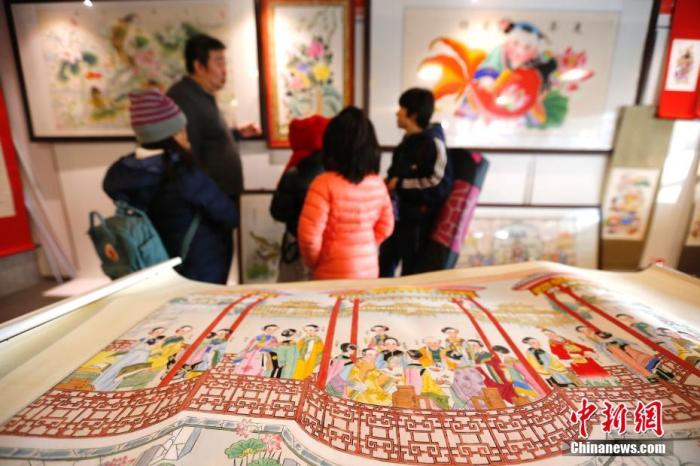
Data Map: As the Spring Festival approaches, people in Beijing buy New Year pictures. China News Service reporter Futian photo
The Spring Festival with a long history
"In addition to the sound of firecrackers at the age of one, the spring breeze warms Tu Su. Thousands of families always change new peaches for old ones. "
After New Year’s Eve, the first day of the first month followed. Du Taiqing in the Sui Dynasty said in the Five Candles Collection: "The first month is the end of the month, and one day is the Yuan Day, which is also a cloud, and it is also a cloud." After the Revolution of 1911, the Gregorian calendar was adopted to count the years, so it was called "New Year’s Day" on January 1st of the Gregorian calendar and "Spring Festival" on the first day of the first lunar month.
Therefore, in this sense, Chinese has a long history of celebrating the Spring Festival. Moreover, in the old folk tradition, the Spring Festival started in La Worship in the twelfth lunar month, or the sacrificial stoves on the 23rd and 24th of the twelfth lunar month did not end until at least the 15th day of the first month (Shangyuan Festival), and the days passed slowly.
"Because it appeared very early, the Spring Festival-related celebrations have existed since their own written records." Wang Juan, a folklorist, said that it was just that the initial activity time was not fixed, and it was not until the Han Dynasty had a standardized calendar that the date was determined.
In the farming society, Chinese New Year is a rare reunion and leisure time in a year. Spring Festival or Spring Festival is more like a continuous process, reaching its climax on New Year’s Eve and the first day of the first month. From the first day of junior high school to the seventh day of junior high school, every day has some exquisite and corresponding customs.
The first day of the first month is "Chicken Day"
The first day of the first month plays a very important role in the whole New Year custom.
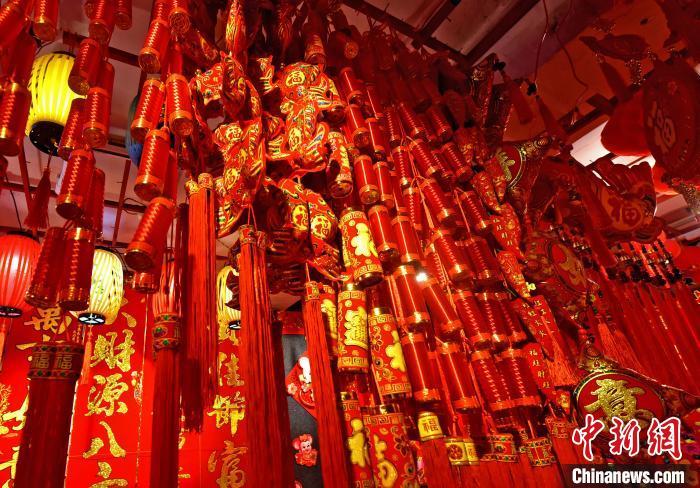
Data map: The picture shows that the shops are full of new year’s goods with a strong flavor. Photo by Yellow River
Legend has it that from the first day of the first month to the seventh day of the first month, Nu Wa made chickens, dogs, pigs, sheep, cows and horses in the first six days, and made people on the seventh day. Therefore, these seven days are called chicken day, dog day, pig day, sheep day, cow day, horse day and human day respectively.
That is to say, the first day of the first month is also the "Chicken Day". The ancients paid special attention to the chicken and called it "the bird of five virtues". The Biography of Korean Poetry said that it has a crown on its head and is a virtue; There is a distance behind the foot to fight, which is a martial virtue; It is brave for the enemy to dare to fight before; It is benevolence to have food to greet the same kind; It is faith to keep vigil and dawn.
There is also a legend that "chickens eat ghosts". On this day, people will paint chickens and stick them on the doors to show their sincerity. The earliest chicken shape was carved on the door, and later it was derived from paper cutting, New Year pictures and other forms: the cock’s mouth was full of "five poisons", that is, scorpions, lizards, etc., which meant to ward off evil spirits.
Celebrate New Year’s greetings to elders and prepare refreshments to entertain guests.
After the New Year’s Eve dinner, I also received the Kitchen God, and stepped on the scraps of firecrackers and paper. As usual, on the first day of the first month of the first month, I was going to "pay New Year greetings" to my relatives and elders. People put on new clothes, prepare refreshments and sweets, and entertain guests.
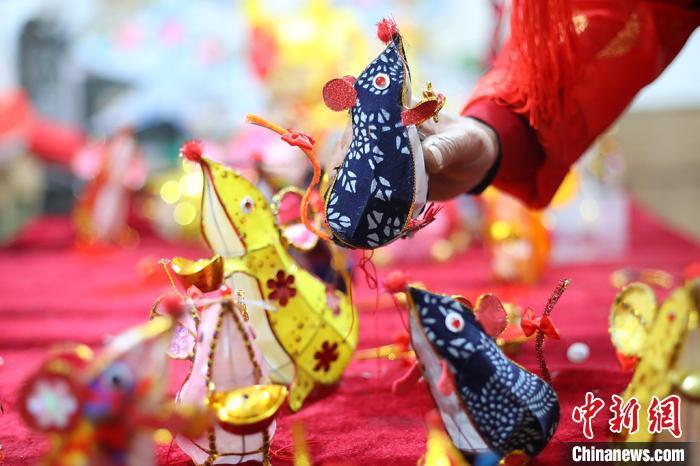
Data Map: Various shapes of "Rat" lanterns. Photo by Luo Bo
This is also a way for people to bid farewell to the old and welcome the new and express their best wishes to each other. Generally speaking, New Year’s greetings begin at home. On the morning of the first day, after the younger generation gets up, they should first pay New Year’s greetings to their elders, saying auspicious words such as wishing good health. The elders should also give some lucky money to the younger generation, and everyone is happy.
After that, neighbors, relatives and friends will also visit each other for New Year’s greetings or get together for drinks. Gu Tieqing, a Qing Dynasty man, described in Qing Jia Lu, "Men and women worship their parents twice, and the master leads a humble family, leaving relatives and friends of their neighbors … … Even those who don’t meet for the rest of their lives, at this time, they also worship each other at the door … …”
During the Spring Festival, people who are familiar with each other meet on the road. They should say "Congratulations on getting rich" and "Best wishes in the four seasons" to each other, or simply say "Happy New Year". Although there are not many words, they are soaked with the festive spirit of the New Year.
With the development of the times, the ways of New Year greetings are constantly changing, adding new contents and forms, such as WeChat New Year greetings and telephone New Year greetings.
Why are you not allowed to "move the broom" on this day?
During the Spring Festival, ancient scholar-officials had the custom of greeting each other with famous cards. Wen Zhiming, a great painter of the Ming Dynasty, described it in the poem "New Year"; "I don’t want to meet each other, but I want to pay tribute, and the famous paper is full of cover; I also throw a few papers with people, and the world hates simplicity and is not too empty. "
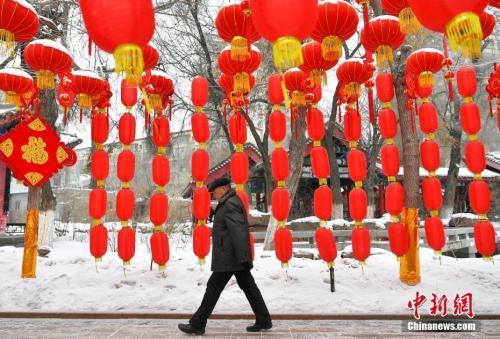
Data map. China News Service reporter Liu Xinshe
The above-mentioned "name thorn" and "name nickname" are a bit like "New Year cards" later. They are convenient and practical for connecting feelings and exchanging greetings, and they are still popular today.
In addition, it is said that the first day of the first month is the birthday of the broom, so you can’t move the broom on this day, otherwise it will sweep away all the good luck. If you have to sweep the floor, you have to sweep the house from the outside, so you won’t "break the money".
In the same way, you can’t throw water out and take out the garbage on this day. People clean their homes on New Year’s Eve. On the first day of the lunar new year, they don’t take out brooms or take out garbage, and then they prepare a big bucket to hold waste water.
Today, those taboos are naturally superstitious, but in terms of real life, they also have another meaning: I hope people will work less and have more rest during the New Year.
In addition to jiaozi, there are these foods on the first day of the first month.
Jiaozi is a must-have food during the Spring Festival. In addition, in ancient times, people also paid attention to eating eggs and spicy dishes. In the Jin and Zhou Dynasties, the local customs record says: "Zhengdan, when you swallow a chicken, it is called refined shape. I also spit five spicy dishes in the morning to help make five Tibetan qi. "
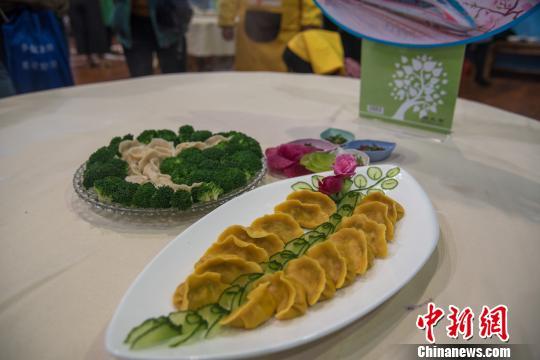
Data Map: jiaozi posed as a fish. Photo by Wang Yizhao
The vegetables put in the five-spice plate are not exactly the same everywhere. Generally, there are five kinds of spicy vegetables, such as onion and leek, and some places will put coriander and spring vegetables. Different dishes have different meanings. But on the whole, "Xin" is homophonic for "new", which means welcoming the new year.
From the perspective of traditional Chinese medicine, eating spicy food is also an adjustment to the body: turbid qi accumulates in the body all winter. The ancients believed that eating spicy herbs is conducive to releasing those turbid qi, and eating "new" things at the beginning of the new year echoes the coming spring.
"If you have money and no money, go home for the New Year." Spring Festival is of great significance in Chinese’s life. Up to now, the old custom has long been a culture that needs no explanation and has been integrated into people’s blood. Even though I have been away from home for many years, I am still haunted by dreams.